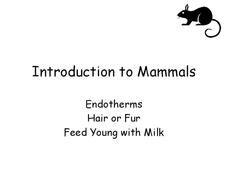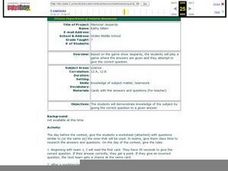Curated OER
What Class Are You In?
Classifying animals has never been this much fun! Pupils discuss the animal groups, fish, reptiles, amphibians, mammals, birds, and also identify their characteristics. Then, they take pictures of animals and classify them in a group...
Curated OER
Birds and Mammals
Providing a higher-level thinking experience, this presentation provides an in-depth and interesting review of mammals. The terms used in the presentation give students a chance to be exposed to scientific classifications. There is also...
Curated OER
Name That Critter
Young learners classify five different animals into their proper category. The animals pictured are a pigeon, a lizard, a cat, a frog, and a goldfish. Pupils are also asked to tell why they know it's a certain kind of animal. An...
Curated OER
Tropical Rainforests
Learners create their own rainforest environment. This tropical rainforest lesson, introduces where rainforests are located, their real world connections, and their structural make up. It includes further resources online.
Curated OER
Who am I? - Mammals
Here is a matching worksheet which has learners identify 16 common mammals. There are accurate and colorful depictions of each of the mammals to be found. An answer key is provided.
Curated OER
Word Search: Common Pond Mammals
Mammals who live in pond environments are the focus of this colorful wordsearch. In it, youngsters find the names of 13 mammals who are found near ponds. Each of the animals has a colorful picture associated with it. Very nice.
Curated OER
Who am I?
Here is a worksheet that allows students to see a picture of an animal and clearly identify it. The pictures are clear and colorful. All of the 16 animals pictured are mammals. This would be a terrific worksheet to use with...
Curated OER
Who Am I?
This worksheet allows learners to see animals and reptiles, and also clearly identify them. There are bats, rats, and more. Here you will find 16 clear and colorful pictures which children must match up with their animal names. This...
Curated OER
Introduction to Mammals
Biology learners grasp the characteristics of mammals by viewing this succinct slide show. They learn that mammals are divided into three gestation-related groups: prototheria, metatheria, and eutheria. They examine the characteristics...
Curated OER
The Five Classes of Vertebrates
What a terrific lesson! Learners discuss the animal kingdom, and classify them as vertebrates and invertebrates. They also identify them as fish, amphibians, reptiles, birds, and mammals. There is even a taxonomic breakdown of popular...
Curated OER
Types of Animals
Learning about animals, and their classifications, is a regular part of the elementary-school curriculum. Using this presentation, learners can review information relating to animal classification, and test their knowledge. This would be...
Curated OER
Word Search: Urban Mammals
Learners find 17 common urban animals. The animals range from bats, to foxes, to opossums. A colorful and accurate drawing of each animal is present on the worksheet, and an answer key is provided. Answers can be horizontal, vertical, or...
Curated OER
Animals A to Z: Orangutan
In this orangutan worksheet, 3rd graders will add pages to their "animal books." Students will read 10 facts to gain an understanding of an orangutan and its particular attributes.
Curated OER
Truly Amazing Mammals
Explore the world of amazing mammals with your kids with special needs. Each child identifies one mammal from a previous lesson and writes a short paragraph on that mammal. This lesson states that it is intended for all levels, but not...
Curated OER
The Beluga Whale, Otters
In these internet activity worksheets, students complete research related to the Beluga Whale and otters. Student are able to answer questions by following directions to help them navigate around a website.
Curated OER
Animals
Students become familiar with the need for categorizing scientific information, in this case, animals. They categorize the 5 groups of animals in a collage and answer questions about each.
Curated OER
Mammal Jeopardy
Seventh graders play a jeopardy like game using information about mammals. Before beginning the game, they complete a worksheet with questions similar to ones that are to be used during the competition. They answer more difficult...
Curated OER
Mammals
Students gather information from an online database about mammals. Choosing one mammal, they compare its physical characteristics, food habits, behavior and location to the other mammals they were introduced to in this lesson plan. In...
Curated OER
Ocean Life: A Heavy Subject
Second graders examine The Learning Page Fact Files about ocean life and categorize the data by weight and group. They distinguish between fish, mammals, and invertebrates and which weigh the most and the least. Students record their...
Curated OER
Technology Squares: Mammals
Review basic vocabulary related to mammals. This short quiz game allows students to test their skills and understanding of scientific vocabulary. This game is appropriate for grades 5-7 and covers very basic concepts.
Curated OER
A Tooth for a Tooth
Learners classify mammals as carnivores or herbivores. They look at a set of pictures of animal skulls, observing the shape and size of the teeth, and identify herbivores and carnivores.
Curated OER
Sunken Millions Animals
This PowerPoint includes a game with ocean graphics in which two teams answer increasingly difficult questions about animals. Topics covered include plant and animal cells, animal adaptation, and similarities and differences between...
Curated OER
Plants and Animals
Students find common needs between plants and animals. In this plants and animals lesson students compare that both plants and animals need food and water. They also find the differences between plant and animal needs.
Curated OER
Mammals of Fields, Meadows, and Hedgerows
In this mammals worksheet, students research the internet to find information and answer short answer questions about mammals of fields, meadows, and hedgerows. Students complete 12 questions.

























